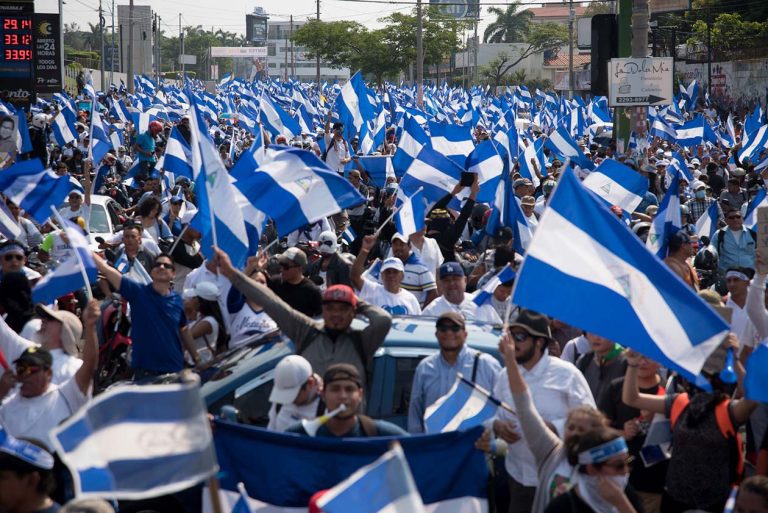10 de abril 2019

Children of Exile: The Births “Sowing Hope” in the Camp of Nicaraguan Farmers

PUBLICIDAD 1M
PUBLICIDAD 4D
PUBLICIDAD 5D
Young Nicaraguans tell what April means to them, the month the civic insurrection began.

La rebelión pacífica de abril en 2018 al régimen de Daniel Ortega. Esa resistencia continúa, según líderes opositores. Foto/Archivo Confidencial
In a few days it will be the first anniversary of the civic struggle in Nicaragua. However, the “self-organized” Nicaraguans state that they’ve been mired in April ever since last year.
For them, that month never ended, and perhaps it won’t end until the regime departs. The protagonists of last year’s events speak of the meaning that April has had in their lives.
“There’s not a minute when April isn’t present in my mind and body, and I have to speak of that,” says student leader Madelaine Caracas. “April was the awakening of a purpose that goes beyond the moment, which is the search for change. It was a month of pain, suffering and at the same time great valor, solidarity and brother and sisterhood on the part of Nicaraguans.
“April is that link to memory, to not forgetting the struggle ahead for liberty. April is my life until I succeed in returning to my country, a country I was torn from and forcibly displaced from, in order to safeguard my life,” Madelaine says. On this date last year, she led the protests to quash the forest fire that was devouring the Indio Maiz biological reserve. Later, she joined the University Coordinator for Democracy and Justice.
For others as well, April is a synonym of changes and ruptures in the family. Beginning on the 18th of that month, nothing ever went back to being the same.
Lisa Garcia is an example of that. She assures that in April she was able to break with the Orteguista ideas she had been brought up with and that prevented her from understanding reality.
“April means being in disagreement with my family and creating a breach for an idea of justice that I defend, although I had never before contradicted them. It also means being persecuted for not thinking like he who has the “power”, being arrested without justification, and living with the fear of going out on the street and running into the police. This situation couldn’t be more contradictory. For me, April signifies pain, but also the discovery of an intense love for my Nicaragua,” Garcia affirms.
Yolanda Sanchez, one of the political prisoners who was transferred to house arrest last month, said April is a bastion of the civic struggle to seek a free Nicaragua. She admits that “in April I lost my fear. I’m willing to defend my country, because I can’t feel comfortable when I know that there’s still so much to do… It’s already been demonstrated that Nicaragua is strong and courageous, and that we can, and we will achieve our freedom with the help of God,” she says.
An awakening for the youth
Alejandro Centeno, a student who was detained for participating in the protests and had to go in to exile due to the harassment, says that April is and will be remembered as the month in which the youth rose up. It’s the awakening of the country’s “moral reserve”.
“April made the youth take on a debt that doesn’t belong to us, but that we’ve assumed with great commitment and courage. The results are clear: the majority of those killed are young people, students; the majority of the prisoners are young; the majority of the exiled are young.
“April means united, since we saw how Catholics, Protestants, feminists, atheists, the LGBTQI community and the farm producers all united for a single goal, leaving our differences aside. April is the hope that we’ll return to the streets without fear that they’ll kill us or imprison us; that we return to the classrooms, that we’ll have a new country free of dictatorship. April is the rebirth of Nicaragua,” says Centeno.
In the last year, more than 325 people have been killed for joining the civic protests, more than 750 people became political prisoners and over 55 thousand people have had to leave the country for fear of dying, being imprisoned or for the economic crisis that Nicaragua is experiencing.
Thank you for reading our English section, brought to you in collaboration with Havana Times. If you wish to subscribe to our English Weekly Newsletter, you can do it here. Please spread the word and share this link with your friends, family or contacts.
Regards,
Archivado como:
PUBLICIDAD 3M
Confidencial es un diario digital nicaragüense, de formato multimedia, fundado por Carlos F. Chamorro en junio de 1996.
PUBLICIDAD 3D